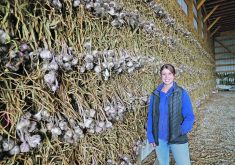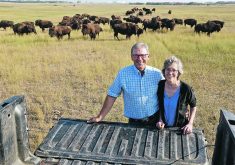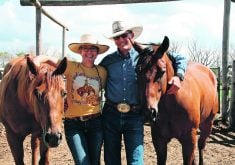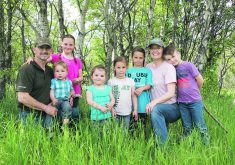On the Farm: The Monchuks turn their farm into a modern operation and hope to pass it on to their children
Maintaining strong family ties has always been an important consideration at the Monchuk family farm near Lanigan, Sask.
So it brings a smile to Clinton Monchuk’s face when his son Jackson, 10, talks about carrying on the family tradition.
“It kind of warms my heart because I remember sitting on my dad’s lap when I was a kid, during harvesting and seeding, and falling asleep in the tractor or combine…,” says Monchuk.
“He (Jackson) just loves it. He’ll jump in the combine with me at 10 in the morning and he’ll ride with me all day, until 9 or 10 at night.
Read Also

Nutritious pork packed with vitamins, essential minerals
Recipes for pork
“He says, ‘well Dad, maybe when I’m finished playing hockey or pitching in the major leagues, I’ll come back and help run the farm.’ ”
The Monchuk family has deep roots in prairie agriculture.
Clinton’s grandfather John — a prisoner during the First World War — moved to Canada in the early 1920s and homesteaded on a quarter section a few kilometres northeast of Lanigan.
Years later, when Clinton’s grandfather passed away, Clinton’s father Fred took over the farm and grew it into the modern operation that it is today.
Clinton and his brother, Andrew, bought the farm in 2009, with the help of a professionally crafted farm succession plan.
“It was money well worth spending in terms of getting professional advice because there are four other siblings besides my brother and myself,” Clinton says.
“We wanted to make sure everybody had input, everything was legal, and it was something everyone could agree to.”
The Monchuks plant about 3,600 acres every year.
Their rotation includes wheat, barley, canola, peas, soybeans, flax and mustard.
Another 400 acres of pasture land has been rented out since the family got out of beef production a few years ago.
The family also ran a dairy operation for more than 35 years.
Clinton’s parents, Fred and Anne, started the dairy in the early 1970s and managed it until 2009.
The family eventually sold its quota and the dairy herd, a move that allowed them to focus more energy on grain farming.
In 2016, Clinton and Andrew received a share of new quota made available in the laying industry.
They have been partners in a laying operation for the past three years.
The laying operation consists of 8,200 hens in a cage-free environment.
Eggs produced in a free-run environment command a premium at the supermarket.
Clinton, an animal welfare advocate, admits that cage-free production can have its challenges.
“I’ll be the first to admit that there are pros and cons to it,” he says.
“For example, it takes a lot longer to do the chores. There’s more mortality, less production and the egg size isn’t as big (compared to) … an enriched housing system.”
Clinton’s children, Jackson and daughter Katelyn, age 6, are also engaged in agriculture and show a keen interest in learning about how food is grown and how modern farming is perceived by consumers and the outside world.
Clinton’s wife, Laura, is no stranger to the industry either.
She grew up on a Black Angus ranch in Oklahoma.
She and Clinton met when Clinton was working as an intern for a prominent American farm lobby group in Washington, D.C.
Today, they live in Saskatoon, although Clinton spends most of his days at the farm, about 100 kilometres away.

Clinton has always had a strong interest in agricultural policy.
He serves as the executive director of Farm & Food Care Saskatchewan, an organization that works to build closer ties between farmers and consumers.
Before that, he served as the director of trade policy at the Canadian Federation of Agriculture and as chief executive officer with Chicken Farmers of Saskatchewan.
Clinton says his previous career as a full-time ag lobbyist was rewarding and interesting but it involved a lot of travel and significant time away from his family.
His current position with Farm & Food Care Saskatchewan allows him to stay involved in the policy side of agriculture without leaving the farm.
“Farming is a great career but it’s become more than just growing crops and selling them,” he says.
“As an industry, we have to make sure that we’re being pro-active and getting our message out to consumers about what we’re doing and how we’re producing food.”
“When people have questions, we need to have answers for them” about the benefits of modern farming practices, fertilizer use and crop protection products, he says.


















